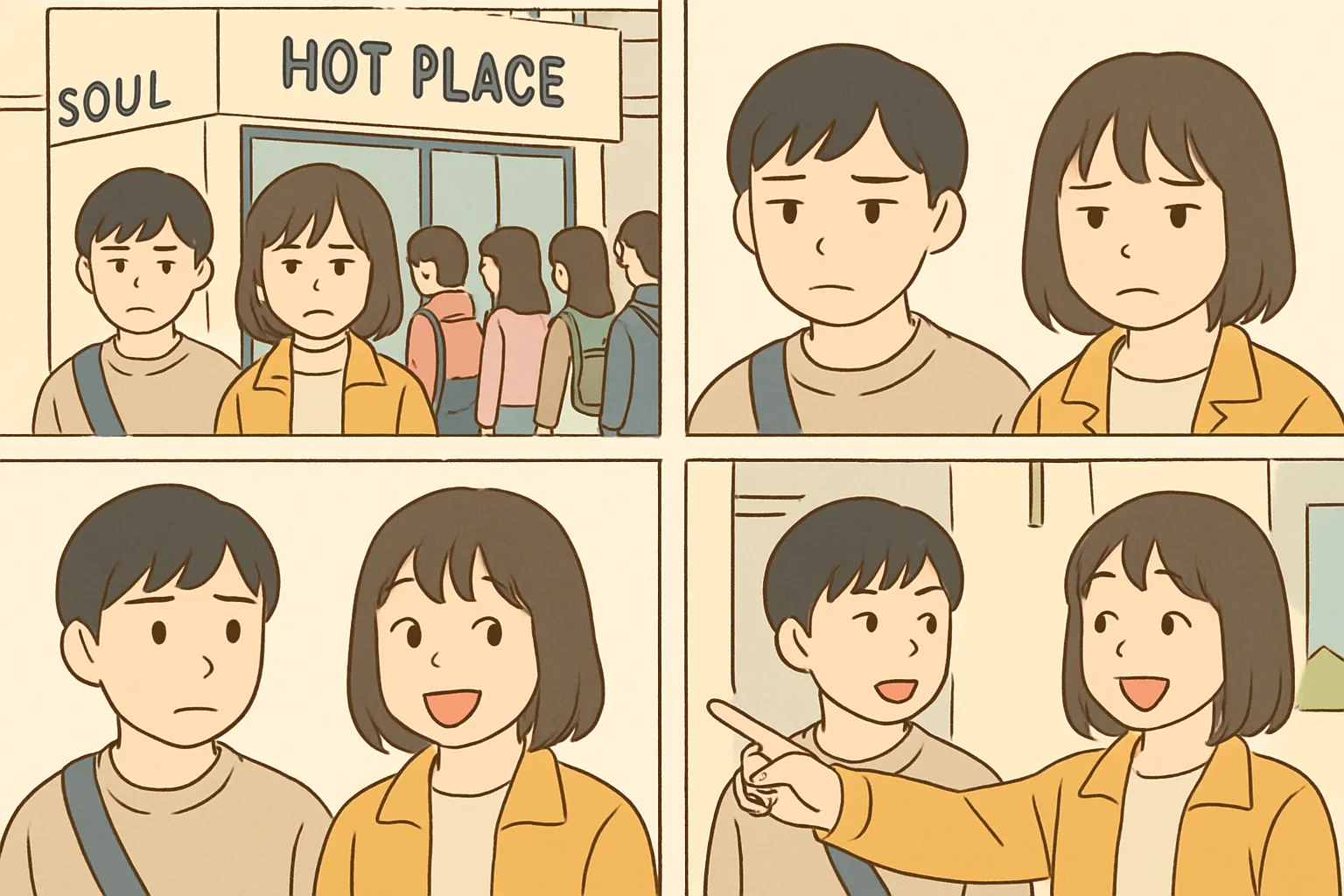K-Drama Debates IRL: Talking Politics Across Generations in Korea
Hello! It’s your favorite Korean language guide, Maeil Hangeul (매일한글), here to level up your skills!
Ever found yourself in a tricky conversation with Korean friends or family about a “serious” topic? Talking about social or political issues can be tough in any language, but in Korean, there’s an art to doing it respectfully, especially across different generations.
Lately in Korea, you see this all the time! From family arguments in hit dramas to lively discussions on variety shows, there’s a growing conversation about how different generations see the world. Today, we’ll learn the essential phrases to navigate these conversations smoothly, so you can share your own thoughts confidently and politely, just like a seasoned K-drama protagonist!
Key Expressions for Respectful Debates
Here are your secret weapons for sounding thoughtful and fluent when discussing sensitive topics.
1. (제 생각에는) ~인 것 같아요 [(je saeng-gag-e-neun) ~in geot gat-a-yo]
- English Meaning: In my opinion, it seems that… / I think that…
- Detailed Explanation: This is the #1 way to state your opinion softly. The grammar pattern
~는/은/인 것 같다literally means “it seems like…” or “it looks like…”. It makes your statement sound less like a hard fact and more like a gentle observation. Adding제 생각에는(in my opinion) at the beginning makes it even more polite. It’s perfect for avoiding sounding too aggressive.
2. 일리가 있네요 [il-li-ga it-ne-yo]
- English Meaning: You have a point. / That makes sense.
- Detailed Explanation: This is a fantastic phrase to show you are actively listening and respect the other person’s viewpoint, even if you don’t fully agree.
일리 (일리)means ‘reason’ or ‘logic’. By saying their argument has logic, you validate their perspective before adding your own. It’s a very mature and respectful expression.
3. 그 부분은 저와 생각이 좀 다르네요 [geu bu-bun-eun jeo-wa saeng-gag-i jom da-reu-ne-yo]
- English Meaning: I have a slightly different opinion on that part.
- Detailed Explanation: This is the ultimate polite way to disagree. Instead of a direct “No” or “You’re wrong” (틀렸어요), which can sound confrontational, this phrase gently states that your thoughts are different. The word
좀(a little) is crucial as it softens the entire sentence. You’re not saying they are completely wrong, just that you see it a bit differently.
4. 조심스러운 이야기지만… [jo-sim-seu-reo-un i-ya-gi-ji-man…]
- English Meaning: This is a sensitive topic, but… / I know this is a delicate subject, but…
- Detailed Explanation: Use this as a preface before introducing a potentially controversial idea. It signals to your conversation partner that you recognize the topic’s sensitivity and intend to proceed with care. It’s like putting up a friendly “handle with care” sign before you speak, which immediately makes the listener more receptive.
Example Dialogue
Let’s see these phrases in action! Imagine Somi (a university student) talking with her Grandfather (할아버지) about a new urban development project they saw on the news.
할아버지 (Grandfather): 저기 새 건물을 짓는 것 때문에 옛날 시장이 사라진다니, 너무 아쉽구나.
(It’s such a shame that the old market is disappearing because they’re building that new building.)
소미 (Somi): 조심스러운 이야기지만, 제 생각에는 그 지역을 개발하는 게 도시 발전에 꼭 필요한 것 같아요.
(I know this is a sensitive topic, but in my opinion, it seems developing that area is necessary for the city’s growth.)
할아버지 (Grandfather): 그래도 우리 추억이 다 사라지는 것 같아서 섭섭하지.
(Still, it’s sad because it feels like all our memories are disappearing.)
소미 (Somi): 네, 할아버지 말씀도 일리가 있네요. 추억이 담긴 곳이니까요. 하지만 그 부분은 저와 생각이 좀 다르네요. 새로운 곳에서 또 좋은 추억을 만들 수 있지 않을까요?
(Yes, what you’re saying makes sense, since it’s a place full of memories. But I have a slightly different opinion on that part. Don’t you think we can make new, good memories in the new place?)
할아버지 (Grandfather): 허허, 그것도 그렇구나. 우리 손녀 다 컸네.
(Haha, I suppose that’s also true. My granddaughter is all grown up.)
Culture Tip & Trend Deep Dive
In Korea, maintaining harmony (화합, hwahap) is often prioritized, especially in conversations with elders or superiors. Directly contradicting someone can be seen as disrespectful.
- The “Yes, but…” Method: A common Korean conversational tactic is to agree with a part of the other person’s statement first before introducing your own view. You’ll sound like a pro if you say, “네, 말씀에 일리가 있네요. 하지만 제 생각에는…” (Yes, you have a point. However, in my opinion…). This shows respect before you pivot.
-
Spotted on TV: Pay attention to Korean debate shows like ‘100-Minute Debate’ (100분 토론) or even panels on news programs. You’ll hear these exact expressions used constantly by politicians, professors, and critics to engage in fierce debates without being rude. It’s a masterclass in polite discourse!
-
K-Pop Idol Approved: K-Pop idols are media-trained experts in using these phrases. When asked potentially controversial questions about their concepts or personal lives, they often start with
조심스럽지만...to frame their answer carefully and thoughtfully.
Let’s Practice!
You’ve got this! Let’s review what we learned.
1. Fill in the Blank:
Your friend says, “AI replacing jobs is a scary thought.” You want to acknowledge their concern but also mention the positive side.
A: AI가 일자리를 빼앗는다고 생각하면 좀 무서워. (It’s a bit scary to think about AI taking away jobs.)
B: 응, 네 말도 (__________). 그래도 새로운 기회도 생길 거라고 생각해. (Yeah, you (have a point). But I think new opportunities will arise too.)
(Answer: 일리가 있네)
2. Make a Sentence:
How would you politely state your opinion that “studying Korean with K-dramas is effective”? Use the ~(으)ㄴ/는 것 같다 pattern.
(Example Answer: 제 생각에는 K-드라마로 한국어를 공부하는 게 효과적인 것 같아요.)
Amazing work today! Now you’re ready to have deeper and more meaningful conversations in Korean.
Challenge yourself! Leave a comment below using one of today’s expressions to share an opinion. We can’t wait to read your thoughts






